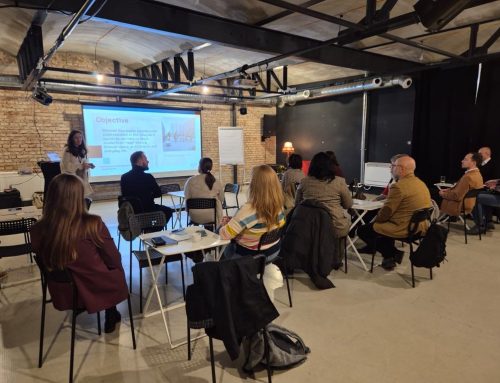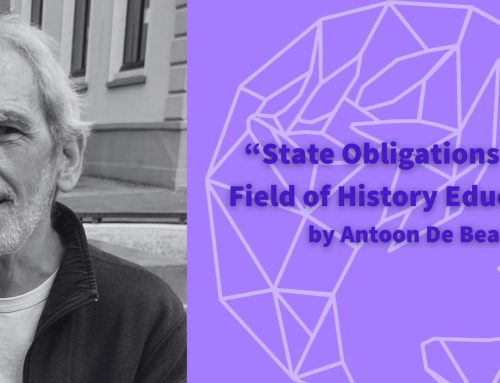The following is a translation of Maria Grever's opinion piece "Democratie steunt op kritische benadering van het verleden", which was published in the Dutch newspaper NRC Handelsblad, 7 January 2022. The piece was written in the context of the recent dissolution of the Russian NGO Memorial. For more on Memorial, please also see the statement and appeal published 24 November 2021.
In his interesting but ominous article about the dissolution of the historic organization Memorial by Russian President Vladimir Putin, journalist Hubert Smeets (NRC, 30-12-2021) concludes: "Woe to the land where the call for a national canon becomes so compelling that in the end, only one consciousness remains." The abolishment of Memorial is intended to stifle any criticism of the Soviet past and current undemocratic decisions. Censorship in Russia goes even further, banning the use of historical skills in history classes to help students think critically about the past.
Despite a prescribed frame of reference knowledge with ten historical eras and a Dutch canon of history and culture in the Netherlands, historical skills are still important in history education, although the teaching time is limited and the false contradiction between knowledge and skills regularly crops up in discussions. Acknowledgment of the importance of historical skills is a hallmark of the Netherlands as a democracy. While history education in Russia consists of memorizing facts and conveying certain (state-dictated) views, Dutch young people learn to carefully read historical texts and sources in order to recognize continuity and change, discern facts and ideologies, and formulate their reasoned analysis of historical issues based on evidence. Teachers also guide them in their search on the internet so that students are somewhat able to unmask fake news and fake histories.
The use of historical thinking concepts in history education and museum education in countries such as the Netherlands, Belgium, England, Germany, and Canada is virtually impossible in totalitarian systems. This applies not only to Russia but also to Poland, for example. In 2017, the director of the Museum of the Second World War in Gdansk, Pawel Machcewicz, was fired by the right-wing conservative government. The reason: his museum was not patriotic enough because, in the exhibitions, he also gave space to experiences and perspectives from other countries. The emphasis was to be on the Polish story of national pride, heroes, and martyrs. The result is a form of equalization that effectively robs Poles of their history.
By applying historical thinking, young people can become aware of the changing interpretations of the past. In the Netherlands, you can make high school students discover that the polarisation between Catholics and Protestants around 1900 in historiography led to opposing interpretations of the Dutch Revolt against the Spanish king in the 16th century. From about 1970, this so-called "pillarized" approach to historiography disappeared, and national history was written and taught in a more distant way. Today, Dutch history is important again, and there are other points of conflict, such as the interpretation of slavery and the colonial past.
Precisely this permanent history of new interpretations – called wirkungsgeschichtliches Bewußtsein by the German philosopher Hans-Georg Gadamer – undermines the idea of fixed historical facts and poses a significant threat to authoritarian leaders who legitimize their position on the basis of a specific representation of the past. Putin's authority increasingly relies on a glorifying portrayal of Russia's past. As under Joseph Stalin, Russian history is regularly rewritten today, but always from only one perspective, that of the Kremlin.
The best we can pursue in research and education is a dialogue about the changing past with sound arguments and evidence. This type of history education is indispensable for a democracy. Exploring different historical interpretations increases the knowledge people rely on when making judgments. In contrast, legal decrees on public memories and top-down canons lead to a petrification of history. They are all attempts to escape the workings of the past: the elimination of the living, productive aspect of interpretation.
However, the past cannot be easily squeezed into a straitjacket. It is illusory that Putin's canon and the dismantling of Memorial founded by Soviet dissident Andrei Sakharov could cut the Russians completely off from Stalin's history. People often appear to be connected in many ways with handed-down histories that influence their thinking and behavior. That is why a reflection on the permanent history of interpretations is so important for our knowledge of the present world.
* 'Memorial International' is a well-known and much-respected civil rights organization and historical society, operating from their headquarters in Moscow, Russia.
Maria Grever is em. professor of Theory of History and founding director of the Center for Historical Culture at Erasmus University Rotterdam. She is currently a research fellow of the NL-Lab KNAW Humanities Cluster, Amsterdam, The Netherlands.













